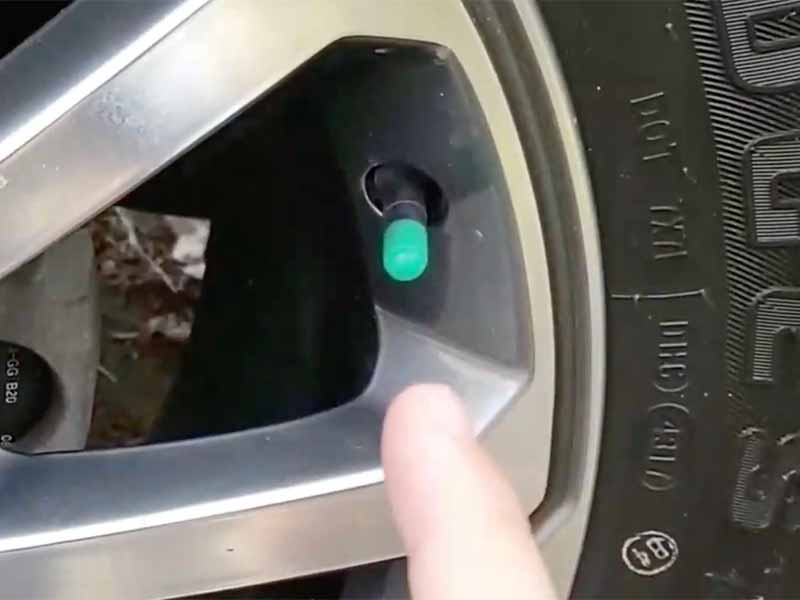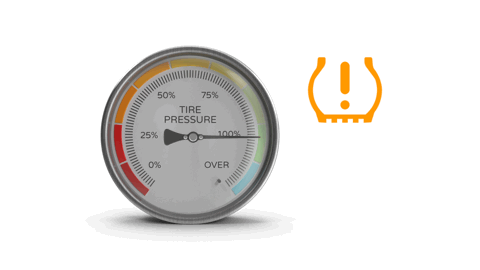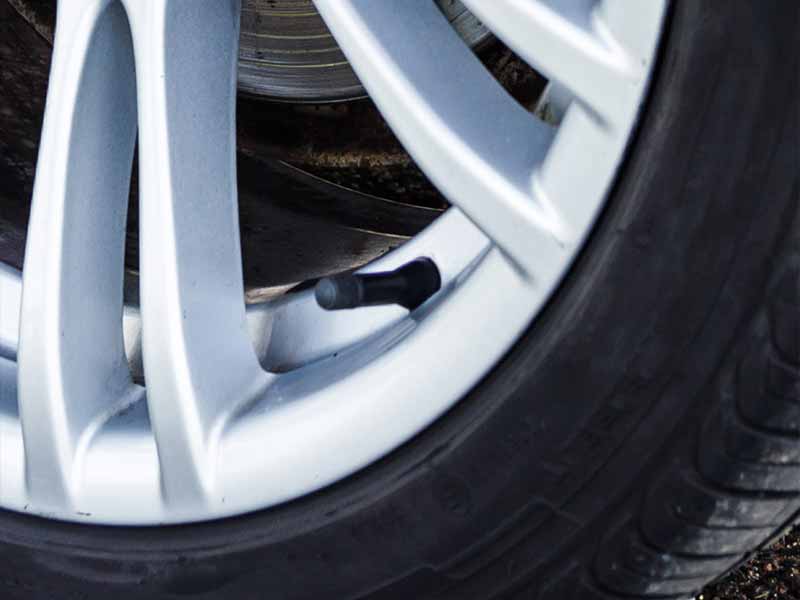One tiny, yet important component of tire maintenance is the often-overlooked tire air cap. While it may not be an emergency situation when one goes missing, it’s something you shouldn’t brush off as inconsequential.
Tire Air Cap Missing
If a tire air cap is missing, the valve stem becomes exposed to dirt, debris, and potential damage, which can lead to complications with tire pressure measurements and inflation. Also, its absence increases the risk of air leakage, impacting tire performance, vehicle handling, and fuel efficiency.
In this article, we’ll dive deep into the world of tire air caps and explore their importance in maintaining your vehicle’s tires. We’ll discuss the purpose of valve caps, why they’re necessary, and what happens if they go missing.
Let’s take a closer look.

What is the Purpose of the Valve Cap on a Tire?
Valve caps may seem like minor components, but they serve several crucial functions that contribute to tire health and performance:
Safeguarding The Valve Stem
Valve caps shield the valve stem from potential damage caused by various factors such as road debris, impacts from daily driving, or accidental bumping when adding air to the tire. By protecting the valve stem, valve caps ensure that it functions correctly and lasts longer, preventing air leakage and maintaining consistent tire pressure.
Keeping Out Dirt And Debris
Valve caps act as a barrier against dirt, dust, moisture, and other contaminants that could enter the valve stem. Such debris can create blockages or damage the valve core, which can lead to complications with tire pressure measurements and make inflating or deflating tires more difficult. By keeping debris out, valve caps help maintain the integrity and accuracy of your tire pressure monitoring system.
Providing An Extra Layer Of Protection Against Air Leakage
Although the valve core is primarily responsible for retaining air inside the tire, valve caps offer an additional level of security. If the valve core is not sealing correctly due to wear or damage, the valve cap can help prevent air from escaping, ensuring that the tire maintains its optimal pressure. Consistent tire pressure is vital for tire performance, longevity, and vehicle safety.
Acting As A Secondary Seal
Some valve caps come equipped with a rubber seal or O-ring that creates an airtight seal when screwed onto the valve stem. This secondary seal provides extra protection against air leaks and helps maintain consistent tire pressure, even if the valve core is slightly damaged or not sealing correctly.
Contributing To The Visual Appeal Of The Tires
Although not a primary purpose, valve caps can add an aesthetic touch to your tires. They are available in various materials, colors, and designs, allowing you to customize your vehicle’s appearance to suit your personal style. While this aspect may not affect the tire’s performance, it can be a fun way to make your vehicle stand out.

Are Valve Stem Caps Necessary?
The importance of valve stem caps may not be immediately apparent, but they are essential for maintaining the health and performance of your tires.
Here’s why valve stem caps are necessary:
Benefits Of Using Valve Stem Caps
- Enhanced Valve Stem Protection: Valve stem caps protect valve stems from accidental damage, road debris, and weather-related elements, ensuring their proper functioning and extending their lifespan.
- Consistent Tire Pressure: By providing an extra layer of protection against air leaks, valve stem caps help maintain consistent tire pressure, promoting even tire wear, fuel efficiency, and optimal vehicle handling.
- Debris Protection: Valve stem caps keep out dirt, dust, moisture, and other contaminants, preventing blockages or damage to the valve core that can interfere with tire pressure measurements or inflation/deflation processes.
Risks Of Not Using Valve Stem Caps
- Vulnerable Valve Stems: Without a valve stem cap, valve stems are exposed to potential damage from road debris, accidents, or weather-related elements, which could compromise their functionality over time.
- Debris Accumulation: The absence of a valve stem cap leaves the valve stem susceptible to dirt, dust, and moisture infiltration, potentially causing blockages or damage to the valve core.
Unreliable Tire Pressure
A missing valve stem cap offers no backup protection against air leaks if the valve core is damaged or not sealing properly. This can result in inconsistent tire pressure, leading to uneven tire wear, reduced fuel efficiency, and suboptimal vehicle handling.

What Happens If You Don’t Have a Tire Cap?
Although a missing tire cap might seem like a minor issue, it can lead to several unfavorable consequences that impact the health and performance of your tires:
- Exposure To Dirt And Debris: Without a valve stem cap, your valve stem is vulnerable to infiltration by dirt, dust, moisture, and other contaminants. Over time, these foreign particles can cause blockages or damage the valve core, making it difficult to accurately measure tire pressure or inflate/deflate the tire as needed.
- Increased Risk Of Air Leakage: A missing valve stem cap leaves your tire without a secondary layer of protection against air leaks. If the valve core is slightly damaged or not sealing correctly, the lack of a valve stem cap can result in slow air leaks. These slow leaks can cause your tire pressure to drop gradually, potentially leading to several negative outcomes.
- Potential Impact On Tire Performance: Tires with incorrect pressure, whether over- or under-inflated, can suffer from various performance issues, including:
- Poor Vehicle Handling: Tires with inconsistent pressure may not provide sufficient traction or grip, making it difficult to control the vehicle, especially in challenging driving conditions.
- Reduced Fuel Efficiency: Improper tire pressure can negatively affect your vehicle’s fuel economy, leading to increased fuel consumption and costs.
- Increased Tire Wear: Incorrect tire pressure can result in uneven tire wear, reducing the overall lifespan of your tires and necessitating more frequent replacements.
- Decreased Braking Performance: Tires with inadequate pressure can compromise the effectiveness of your braking system, increasing stopping distances and posing safety risks.
Does a Valve Stem Cap Keep Air In?
The primary component responsible for keeping air inside the tire is the valve core, which is housed within the valve stem.
However, the valve stem cap plays a valuable supporting role in retaining air pressure. Here’s how valve stem caps provide extra security:

Role Of The Valve Stem Core
The valve core is a small, spring-loaded mechanism that serves as the primary seal for the tire’s air pressure. When properly seated and functioning, the valve core prevents air from escaping the tire, ensuring consistent pressure and optimal tire performance.
- Extra Protection From Valve Stem Caps: Although valve cores are designed to retain air pressure, they can become damaged or fail to seal correctly over time, leading to air leaks. Valve stem caps offer a secondary barrier that helps prevent air from escaping if the valve core isn’t functioning as it should.
- Additional Sealing Capabilities: Some valve stem caps come with a rubber seal or O-ring that creates an airtight seal when screwed onto the valve stem. This added seal provides an extra layer of protection against air leaks and helps maintain tire pressure even if the valve core is slightly damaged or not sealing correctly.
Are Valve Stem Caps Universal?
Although there are some standard valve stem cap sizes that fit the majority of cars and trucks, not all valve stem caps are universal.
Here are some factors to consider when selecting a valve stem cap for your vehicle:
- Standard Size For Most Cars And Trucks: The most common valve stem cap size, which fits the Schrader valve stems used on most passenger cars and trucks, is a universal design that works across various vehicle makes and models. Schrader valve stem caps typically have a standard thread size of 0.305 x 32 TPI (threads per inch).
- Specialty Caps For Specific Applications: In some cases, vehicles may use different valve stem types, such as Presta or Woods valves, which are more common on bicycles. These valve stems require unique valve stem caps designed to fit their specific thread patterns and sizes. Additionally, vehicles equipped with a Tire Pressure Monitoring System (TPMS) may require specialized valve stem caps that are compatible with the sensors.
- Choosing The Right Cap For Your Vehicle: To ensure you select the correct valve stem cap for your vehicle, it’s essential to:
- Identify the type of valve stem used on your vehicle (Schrader, Presta, etc.).
- Determine if your vehicle has any special requirements, such as compatibility with a TPMS or pressure indicator caps.
- Consider your preferences regarding material, style, and additional features like secondary seals or O-rings for added protection.
Are Metal Valve Caps Bad?
Metal valve caps are not inherently bad, but they do have some advantages and disadvantages when compared to plastic valve caps.

Here’s a closer look at the pros and cons of using metal valve caps on your vehicle’s tires:
Advantages Of Metal Valve Caps
- Durability: Metal valve caps, typically made of aluminum or brass, are more robust and long-lasting compared to their plastic counterparts. They are less likely to crack, break, or wear down over time.
- Aesthetic Appeal: Metal valve caps often have a more polished and refined appearance than plastic caps, allowing you to customize your vehicle’s look according to your preferences.
- Resistance To Temperature Extremes: Metal valve caps can withstand higher temperature variations without deforming, which can be advantageous in extreme weather conditions.
Disadvantages And Potential Issues
- Corrosion And Seizing: Metal valve caps can corrode, especially if made of dissimilar metals from the valve stem. This can lead to the cap seizing onto the valve stem, making it difficult or impossible to remove without damaging the valve stem itself.
- Weight: Metal valve caps are generally heavier than plastic caps. While the difference is minimal, it could potentially impact tire balance on high-performance vehicles or in situations where precise tire balance is critical.
- Compatibility With TPMS: Some metal valve caps might not be compatible with vehicles equipped with a Tire Pressure Monitoring System (TPMS), potentially causing interference with the sensors.
Comparing Metal And Plastic Valve Caps
- Functionality: Both metal and plastic valve caps serve the same primary functions, protecting the valve stem and providing an additional layer of protection against air leakage.
- Material Considerations: When choosing between metal and plastic valve caps, consider factors such as corrosion resistance, compatibility with your vehicle’s features (e.g., TPMS), and personal aesthetic preferences.
- Weighing The Pros And Cons: While metal valve caps offer some advantages, such as durability and temperature resistance, it’s essential to be aware of potential issues like corrosion and compatibility concerns. Ultimately, the choice comes down to your specific needs and preferences.
Resources
Below are some links you may find helpful when learning about tires
Final Thoughts
We’ve explored the importance of tire air caps, those small but mighty components that protect your valve stems, help maintain tire pressure, and keep dirt and debris at bay.
Remember, maintaining your tire health doesn’t have to be complicated. By regularly checking your tire pressure, making sure your valve stem caps are present and in good condition, and addressing any potential issues early on, you can save yourself from potential hassles down the road.
Good luck and happy motoring.





